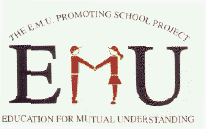CAIN Web Service

The
EMU Promoting School
Project
- Schools Involved
[EMU Promoting School Project - Home Page]
Text: Lorraine Hefferman
Schools Involved in the Project
The EMU Promoting School Project has
worked in partnership with the following schools in order to promote
peer mediation among both the teaching/school staff and students
which eventually becomes part of the schools mechanisms as a service
on offer to all students.
Primary Schools
- Oakgrove Integrated Primary School
- Model Primary School
- Ballysally Primary School
- Acorn Integrated Primary School
- Braidisde Integrated Primary School
- Corran Integrated Primary School
- Cranmore Integrated Primary School
- Windmill Integrated Primary School
- St. Theresa's Primary School
- Dunamanagh Primary School
- St. Patrick's Primary School, Dunamanagh
Secondary Schools
- Oakgrove Integrated College
- Coleraine Boys Secondary School
The following schools staff bodies were
engaged with EMU Promoting School Project in peer mediation training.
- Corran Integrated Primary School
- Cranmore Integrated Primary School
- St. Mary's Primary School, Greenlough
Peer Mediation
Through peer mediation the above schools
learned an alternative way to resolve their disputes and conflicts.
They are skilled to be able to understand, through communication,
co-operation and affirmation the differing viewpoints that define
human interaction. Children, like adults, have a natural need
to solve their own problems and peer mediation is a tool which
make this possible. Through peer mediation, conflict resolution
becomes a learning opportunity as the children are empowered to
resolve their disputes and become skilled in the recognition of
conflict that requires adult assistance.
Peer Mediation Workshops
Through six one and a half hour workshops,
a whole class is taught how to resolve conflict through mediation.
Each workshop, even though all the workshops are conducted in
an informal fashion, each have a clearly defined focus and objective,
the focus being on one particular aspect of the mediation process.
Each workshop is re-enforced by the teacher through supporting cross curricular
activities. For example in Workshop One an overview of the mediation
process is delivered to the children through the medium of fairy
stories. An extension activity could be to have the children
in groups look at other traditional stories with a view to seeing
through the eyes of the particular characters. 'Jack and the
Beanstalk' from the giants point of view or 'Cinderella' from
the ugly sisters viewpoint. This activity is not only useful
in developing mediation skills but also in the enhancement of
the whole creative thinking and writing process.
Workshop Objectives
Prior to the commencement of the workshop
training, agreement and a bond of trust must exist between the
adults and children. To this end shared and equally owned
Ground Rules are developed which may include:
- It's Okay to Make Mistakes, One
Person Speaking at a Time, No Put Downs, Keep Good Secrets, etc.
These Ground Rules set the tone and
open the door to children's conflict where shared learning can
begin. Teachers will normally attend a one/two day induction
training course prior to beginning formal training with their
pupils.
Week One: Introduction
The first workshop of the series sets
the tone and gives an overview of the mediation training process
by using a fairy tale to demonstrate that all parties at conflict
have valid points. Dialogue and listening skills are practised
and demonstrated so as to highlight their significance in the
resolution process.
Week Two: What does a Mediator do?
The aims of the second workshop are to
visualise the conflict through the mediators eyes and to develop the skill
of listening attentively in order to summarise the conflict.
The workshop establishes the concept of resolution and the initial
components of a mediation.
Week Three: Everyone has a Go.
This workshop aims to familiarise the
children with the way to begin a mediation session and gives them
all practice in how a mediator sets a scene. Adherence to the
Ground Rules is practised.
Week Four: Generating Solutions.
This workshop allows the children to
experience the value of the three techniques for generating solutions
to the conflict. Through interactive role-play, the skills of
bargaining, talking separately and brainstorming are experienced
as a means of helping the disputants to produce solutions.
Week Five: Bringing a Mediation to
Conclusion.
This session is used to revise the skills
learned in the previous workshop. Children are divided into small
groups and allowed to carry out a mediation, based on a personal experience,
to an agreed solution.
Week Six: Who would make a good Mediator.
To solidify their understanding of the
process and set it in a school context. Who wants to be a mediator
and how the other members of the school body can encourage and
support such a system.
All Day Workshop.
The final mediation training session
is conducted over a full day where each child is by this stage
capable of mediating a conflict. A conflict scenario is introduced,
mediated and resolved during a process which the children conduct
on their own. After this a mediation service is launched within the
school system and mediators are appointed.
 EMU Promoting School Project - Home Page EMU Promoting School Project - Home Page
© 1997 EMU Promoting School Project
Last Modified by Dr Martin Melaugh :
Back to the top of this page
| 
